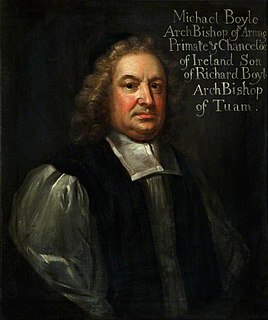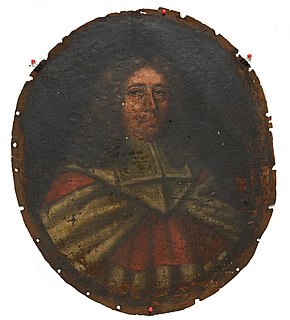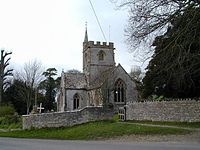
Lieutenant-General James FitzThomas Butler, 1st Duke of Ormond, KG, PC, was a statesman and soldier, known as Earl of Ormond from 1634 to 1642 and Marquess of Ormond from 1642 to 1661. Following the failure of the senior line of the Butler family, he was the second representative of the Kilcash branch to inherit the earldom.
The County Palatine of Tipperary Act 1715 is an Act of the Parliament of Ireland. This Act enabled the purchase by the crown of the Palatine Rights in County Tipperary given to the Earls of Ormond, later Dukes of Ormonde, over the preceding centuries. Prior to the Act, the dukes appointed the sheriffs and judges of the county and owned certain revenues from the county which would otherwise have gone to the Crown.

Michael Boyle, the younger was a Church of Ireland bishop who served as Archbishop of Dublin from 1663 to 1679 and Archbishop of Armagh from 1679 to his death. He also served as Lord Chancellor of Ireland, the last time a bishop was appointed to that office.
Sir James Donnellan was an Irish lawyer and politician, who became Chief Justice of the Irish Common Pleas in 1660. He was unusual among the Irish judges of the time in being of Gaelic descent; and more remarkable in that his service as a judge under Oliver Cromwell did not disqualify him from service after the Restoration of Charles II.
Sir Richard Levinge, 1st Baronet was an Irish politician and judge, who played a leading part in Irish public life for more than 30 years.
John Hartstonge or Hartstongue was an English-born prelate of the Church of Ireland who became Bishop of Ossory and then Bishop of Derry.
John Keating, or Keatinge was an Irish judge of the late seventeenth century, who held office as Chief Justice of the Irish Common Pleas. He had an impressive reputation for integrity, impartiality and benevolence. Due to his loyalty to King James II of England, he was dismissed from his office as Chief Justice after the Revolution of 1688. Later, faced with the threat of impeachment, he committed suicide.

Sir Richard Reynell, 1st Baronet, was an English-born judge who had a distinguished career in Ireland and held office as Lord Chief Justice of the King's Bench in Ireland. He was the first of the Reynell baronets of Laleham.
There have been two baronetcies created for members of the Hastings family headed by the Earl of Huntingdon, one in the Baronetage of England and one in the Baronetage of the United Kingdom. Both creations are extinct.
Sir Edward Smith or Smythe (1602–1682) was an English-born politician, barrister and judge who held the offices of Chief Justice of the Irish Common Pleas and judge of the Irish Court of Claims.
Sir Robert Pointz or Poyntz (1588–1665) was an English landowner and politician. He sat in the House of Commons for Gloucestershire, between 1626 and 1629.
Sir William Davys was an Irish barrister and judge who held the offices of Recorder of Dublin, Prime Serjeant and Lord Chief Justice of Ireland. He was suspected of Roman Catholic sympathies and was threatened with removal from the bench as a result, but he succeeded in retaining office until his death, due largely to his influential family connections.
Sir Paul Davys was an Irish politician and civil servant, who held office as Clerk to the Privy Council of Ireland and later as Secretary of State (Ireland). He had considerable influence in public affairs, and enjoyed the close friendship of the Lord Lieutenant, James Butler, 1st Duke of Ormonde. His sons, William and John, both attained high office. He was the grandfather of Paul Davys, 1st Viscount Mount Cashell.
Sir John Plunket was an Irish politician and judge of the Tudor era who held the office of Lord Chief Justice of Ireland. He was also a member of the Privy Council of Ireland and was regarded by three successive English monarchs as a valued servant of the Crown. He was noted for his integrity, but was criticised for remaining in office when old age and illness had made him clearly unfit for his duties. He was also notable as the fifth of the six husbands of Jenet Sarsfield.
Thomas Dongan (c.1590–1663) was an Irish judge of the seventeenth century. His career was dogged by accusations of recusancy and of disloyalty to the English Crown. He is chiefly remembered as the father of Margaret Dongan, wife of the Dutch scholar Arnold Boate, who commemorated her lovingly in his book The Character of a Truly Virtuous and Pious Woman, and also wrote with affection and respect about her father.
Sir John Everard was an Irish barrister, politician and judge. He was notable as the last Irish judge until the reign of James II to openly profess the Roman Catholic faith. His religious beliefs eventually led to his enforced resignation from the Bench in 1607. He then entered politics and was a member of the Irish Parliament of 1613–1615. The Catholic members elected him as speaker of the House of Commons and installed him in the speaker's chair, but due to the creation of new pocket boroughs by James I, the Protestants had the majority and elected Sir John Davies. Everard, in a farcical scene, initially refused to vacate the chair until he was literally sat upon, which caused him to fall into disgrace for a time, but he was later restored to royal favour. His second son Sir Richard Everard was created the first of the Everard baronets of Ballyboy.
Sir Jerome Alexander (c.1585–1670) was an English-born barrister, judge and politician, who spent much of his career in Ireland, and became a substantial Irish landowner. He was a noted benefactor of Trinity College Dublin. As a judge, he was so ruthless in securing guilty verdicts in criminal cases, and in imposing the death penalty on the guilty party, that for many years after his death "to be Alexandered" was an Irish synonym for being hanged.
Sir John Lyndon was an Irish judge and politician of the seventeenth century. He was the first holder of the office of Third Serjeant-at-law, which was created especially for him, apparently as a "consolation prize" for not being made a High Court judge the first time he sought that office.
Robert Johnson (c.1657-1730) was an English-born politician and judge in early eighteenth-century Ireland. He sat in the Irish House of Commons and was appointed a Baron of the Exchequer. In the early 1700s, he was one of an inner circle of trusted advisors to the Lord Lieutenant of Ireland.
John Jeffreys (c.1623-1689) was a Welsh soldier, landowner and politician, much of whose career was spent in Ireland. He fought in the English Civil War on the Royalist side, and later sat in the Houses of Commons of both England and Ireland. He is best remembered as the first Master of the Royal Hospital Kilmainham.



